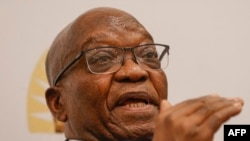Zuma, 81, was sentenced to 15 months in jail for contempt of court in 2021 after refusing to appear before a national inquiry on government corruption. But he served less than two months before being granted medical parole, which was later overturned and reaffirmed by the nation's highest court last week.
Zuma's spokesperson Mzwanele Manyi told VOA that the former president will stay in Moscow as he’s receiving treatment for a “very serious condition.”
“I’m not in a position to breach the doctor-patient confidentiality. There’s no reason he would’ve gone all the way to Russia just to enjoy the weather there. He’s gone there because of health issues … He’s going through various procedures with the medical people; they will say when it’s time for him to come home,” Manyi said.
It is still unclear whether Zuma serve the remainder of his sentence in custody.
Manyi says Zuma has been “punished enough.”
“What South Africans and most people don’t seem to appreciate is that when you are on parole, it’s almost like you’re an outdoor prisoner,” adding that “it was almost like in apartheid time” because Zuma had to report his movements.
Constitutional law expert Pierre de Vos says Zuma openly violated the conditions of his parole, as he was often seen at social events. But he doesn’t believe the former leader should to return to his cell.
“I think we’re far too quick to send people to prison and want to keep them in prison in South Africa in cases where it won’t really make a big difference,” he said.
“Will it send a signal that Zuma’s not above the law or will that not help at all, and if he’s released on correctional supervision and strict restrictions are imposed, would that not be sufficient?”
The former president still faces multiple court cases related to alleged corruption and other financial crimes stretching back to the 1990s.
Zuma's jailing in July of 2021 sparked unrest and violence that left more than 350 dead, according to authorities.

Forum